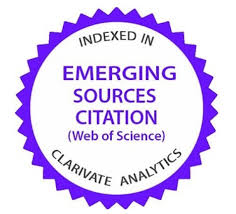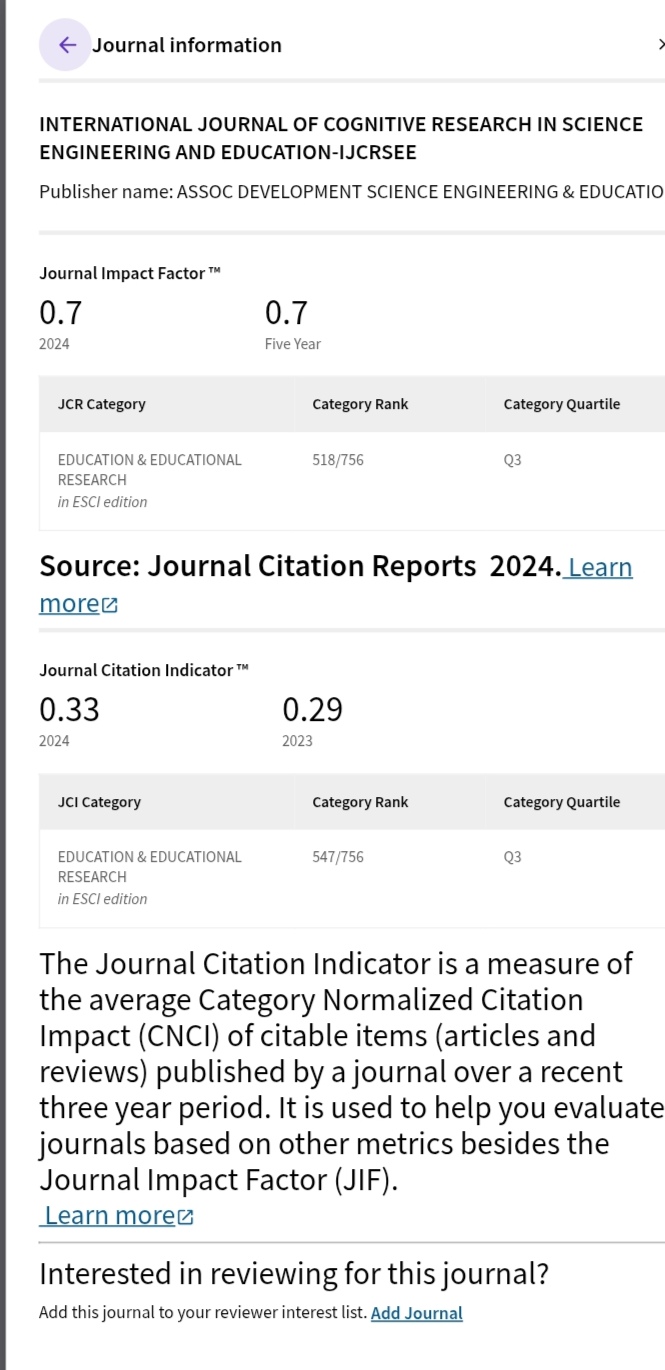Investigation of Prospective Teachers’ Use of Mobile Technologies in Teaching Activities
DOI:
https://doi.org/10.23947/2334-8496-2022-10-2-121-132Keywords:
prospective teachers, mobile technologies, learning activities, pre-service teachersAbstract
The purpose of this research is to examine the pre-service teachers’ use of mobile technologies in teaching activities. In this study, the survey method, one of the research methods, was used. The 199 prospective teachers studying at the Faculty of Education, a private university in Northern Cyprus, were included in the workgroup of the research. The 5-point Likert-type scales were used to measure the frequencies of using mobile technologies in instructional activities, motivation, and attitudes towards mobile technologies, competencies in mobile technology use, and its social effects. It was found that social factors had the lowest effect on the use of mobile technologies. Additionally, no gender-based difference was found in the mobile use frequency, motivation, attitude, competency, and social impact of prospective teachers. Moreover, the frequency, motivation, attitudes, competency, and social impact levels of students from the Department of Computer and Instructional Technologies are significantly higher than those departments from Guidance and Psychological Counselling, Special Education, Music Teaching, Elementary School Mathematics Teacher Education, Department of Pre-School Teaching, Classroom Teaching Department, Social Sciences Teacher Education, Turkish Language Teaching. It was concluded that having problems for mobile learning activities that can be used in the scope of mobile learning significantly influences the frequency of use, motivation, attitude, competency, and social impact of the students. Along with this, it was found that the following factors, given in order of importance, are influential on the frequency of the use of mobile technologies by prospective teachers in instructional activities: motivation, attitude, competency, and social impact.
Downloads
References
Almaiah, M. A., Ayouni, S., Hajjej, F., Lutfi, A., Almomani, O., & Awad, A. B. (2022). Smart Mobile Learning Success Model for Higher Educational Institutions in the Context of the COVID-19 Pandemic. Electronics, 11(8), 1278. https://doi.org/10.3390/electronics11081278 DOI: https://doi.org/10.3390/electronics11081278
Akgül, F., Küpeli, E., & Kır, İ., (2015). Sınıf öğretmenlerinin bilgisayar okuryazarlık düzeylerinin belirlenmesi: Kahramanmaraş ili örneği [Determining the computer literacy levels of classroom teachers: The case of Kahramanmaraş]. Elektronik Sosyal Bilimler Dergisi, 14(55), 207-219. https://doi.org/10.17755/esosder.44589 DOI: https://doi.org/10.17755/esosder.44589
Akhigbe, J. N., Ogbonnaya, U. N., & Owolabi, J. O. (2021). Nigerian preservice teachers’ perceptions of collaborative mobile learning with google classroom: A pedagogical alternative in the era of COVID-19 Pandemic. Nigerian Online Journal of Educational Sciences and Technology, 3(1), 55-65. Retrieved from http://nojest.unilag.edu.ng/article/view/1215/964
Başaran, B. (2022). Mobile Learning and Readiness of Ongoing Foreign Language Teacher Candidates for Future Retrospective Studies. English Language Teaching, 15(2). https://doi.org/10.5539/elt.v15n2p9 DOI: https://doi.org/10.5539/elt.v15n2p9
Büyüköztürk, Ş., Kılıç Çakmak, E., Akgün, Ö. E., Karadeniz, Ş., & Demirel, F. (2018). Eğitimde bilimsel araştırma yöntemleri [Scientific research methods in education]. Ankara: Pegem Akademi. DOI: https://doi.org/10.14527/9789944919289
Cheon, J., Lee, S., Crooks, S. M., & Song, J. (2012). An investigation of mobile learning readiness in higher education based on the theory of planned behavior. Computers & Education, 59(3), 1054–1064. https://doi.org/10.1016/j.compedu.2012.04.015 DOI: https://doi.org/10.1016/j.compedu.2012.04.015
Christensen, R., & Knezek, G. (2017). Readiness for integrating mobile learning in the classroom: Challenges, preferences and possibilities. Computers in Human Behavior, 76, 112-121. https://doi.org/10.1016/j.chb.2017.07.014 DOI: https://doi.org/10.1016/j.chb.2017.07.014
Christensen, R., & Knezek, G. (2018). Reprint of Readiness for integrating mobile learning in the classroom: Challenges, preferences and possibilities.Computers in Human Behavior, 78, https://doi.org/10.1016/j.chb.2017.07.046 DOI: https://doi.org/10.1016/j.chb.2017.07.046
Çavuş, N., & Uzunboylu, H. (2009). Improving critical thinking skills in mobile learning. Procedia Social and Behavioral Sciences, 1, 434–438. https://doi.org/10.1016/j.sbspro.2009.01.078 DOI: https://doi.org/10.1016/j.sbspro.2009.01.078
Çelik, A. (2013). M-Öğrenme tutum ölçeği: Geçerlik ve güvenirlik analizleri [M-Öğrenme tutum ölçeği: Geçerlik ve güvenirlik analizleri]. Journal of Research in Education and Teaching, 2(4), 172-185. Retrieved from http://www.jret.org/FileUpload/ks281142/File/20.celik.pdf
Davis, F. D. (1989). Perceived usefulness, perceived ease of use, and user acceptance of information technology. MIS Quarterly, 319–340. https://doi.org/10.2307/249008 DOI: https://doi.org/10.2307/249008
Dinis Mota da Costa, P. (2016). Digital Reading in PISA 2012 and ICT Uses: How do VET and General Education Students Perform? (No. JRC104713). Joint Research Centre (Seville site). Retrieved from https://publications.jrc.ec.europa.eu/repository/handle/JRC104713.
Elçiçek, M., & Bahçeci, F. (2017). Mobil öğrenme yönetim sisteminin öğrenenlerin akademik başarısı ve tutumları üzerindeki etkilerinin incelenmesi [Examining the effects of mobile learning management system on learners’ academic achievement and attitudes]. Kastamonu Eğitim Dergisi, 25(5), 1695-1714. Retrieved from https://dergipark.org.tr/en/download/article-file/348774
Elçiçek, M. & Karal, H. (2019). Mobil öğrenmeye ne kadar hazırız? Öğretmen adayları perspektifinden bir inceleme [How ready are we for mobile learning? An examination from the perspective of teacher candidates]. Öğretim Teknolojileri ve Öğretmen Eğitimi Dergisi, 8(1), 1-9. Retrieved from https://dergipark.org.tr/en/download/article-file/808965
Galustyan, O. V. (2017). Some methodological aspects of the evaluation of students’ educational achievements at university. International Journal of Cognitive Research in Science, Engineering and Education (IJCRSEE), 5(1), 43–48. https://doi.org/10.5937/IJCRSEE1701043G DOI: https://doi.org/10.5937/IJCRSEE1701043G
Geng, S., Tan, Y., & Yang, L. (2021). Mobile Technologies. In Managing IoT and Mobile Technologies with Innovation, Trust, and Sustainable Computing (pp. 61-78). CRC Press. DOI: https://doi.org/10.1201/9780367822750-4
Georgiev, T., Georgieva, E., & Smrikarov, A. (2004, June). M-learning-a New Stage of Е-Learning. In International conference on computer systems and technologies-CompSysTech (Vol. 4, No. 28, pp. 1-4). DOI: https://doi.org/10.1145/1050330.1050437
Goundar, S. (2011). What is the potential impact of using mobile devices in education. In Proceedings of SIG GlobDev Fourth Annual Workshop. Retrieved from https://aisel.aisnet.org/globdev2011/16
Gökbulut, B. (2021). Uzaktan eğitim öğrencilerinin bakış açısıyla uzaktan eğitim ve mobil öğrenme. Eğitim Teknolojisi Kuram ve Uygulama, 11(1), 160-177. https://doi.org/10.17943/etku.797164 DOI: https://doi.org/10.17943/etku.797164
Hakim, A. R., Asikin, M., & Nurcahyono, A. (2021). The Development of Learning Module with Mobile Augmented Reality Based on 9E Learning Cycle to Improve Problem Solving Skills. Unnes Journal of Mathematics Education Research, 10(1), 1-9. Retrieved from https://journal.unnes.ac.id/sju/index.php/ujmer/article/download/43930/18061
Hwang, G. J., & Chang, H. F. (2011). A formative assessment-based mobile learning approach to improving the learning attitudes and achievements of students. Computers & Education, 56(4), 1023-1031. https://doi.org/10.1016/j.compedu.2010.12.002 DOI: https://doi.org/10.1016/j.compedu.2010.12.002
Khlaif, Z. N., Sanmugam, M., & Ayyoub, A. (2022). Impact of Technostress on Continuance Intentions to Use Mobile Technology. The Asia-Pacific Education Researcher, 1-12. https://doi.org/10.1007/s40299-021-00638-x DOI: https://doi.org/10.1007/s40299-021-00638-x
Koparan, T., & Yılmaz, G. K. (2020). Matematik öğretmeni adaylarının mobil öğrenme ile desteklenen öğrenme ortamına yönelik görüşleri [Opinions of pre-service mathematics teachers about the learning environment supported by mobile learning]. Uludağ Üniversitesi Eğitim Fakültesi Dergisi, 33(1), 109-128. https://doi.org/10.19171/uefad.554184 DOI: https://doi.org/10.19171/uefad.554184
Korucu, A. T., Ertuğrul, U. S. T. A., & Çoklar, A. N. (2019). Eğitim fakültesi öğrencileri ile turizm fakültesi öğrencilerinin mobil öğrenmeye yönelik tutumları. Journal of Theoretical Educational Science, 12(1), 1-15. https://doi.org/10.30831/akukeg.512541 DOI: https://doi.org/10.30831/akukeg.512541
Korucu, A. T. ve Bicer, H. (2018). Investigation of post-graduate Students’ attitudes towards Mobile learning and opinions on mobile learning. International Technology and Education Journal, 2(1), 21-34. Retrieved from https://dergipark.org.tr/en/download/article-file/538498
Korucu, A. T., Yücel, A., Gündoğdu, M. M., & Gençtürk, T. (2016). Investigation the technology usage level of teacher candidates. Participatory Educational Research, 3(1), 14-21. https://doi.org/10.17275/per.15.49.3.1 DOI: https://doi.org/10.17275/per.15.49.3.1
Lestari, R., Astuti, B., & Bhakti, C. P. (2020). A comprehensive teacher strategy for successful online learning process. International Journal on Education Insight, 1(1), 1-12. https://doi.org/10.12928/ijei.v1i1.2064 DOI: https://doi.org/10.12928/ijei.v1i1.2064
Mahat, J., Ayub, A. F. M., & Luan, S. (2012). An assessment of students’ mobile self-efficacy, readiness and personal innovativeness towards mobile learning in higher education in Malaysia. Procedia-Social and Behavioral Sciences, 64, 284-290. https://doi.org/10.1016/j.sbspro.2012.11.033 DOI: https://doi.org/10.1016/j.sbspro.2012.11.033
Martin, F., & Ertzberger, J. (2013). Here and now mobile learning: An experimental study on the use of mobile technology. Computers & Education, 68, 76-85. https://doi.org/10.1016/j.compedu.2013.04.021 DOI: https://doi.org/10.1016/j.compedu.2013.04.021
Menzi, N., Çalışkan, E., & Çetin, O. (2012). Öğretmen adaylarının teknoloji yeterliliklerinin çeşitli değişkenler açısından incelenmesi [Examining the technology competencies of teacher candidates in terms of various variables]. Anadolu Journal of Educational Sciences International, 2(1), 1-18. Retrieved from https://dergipark.org.tr/en/download/article-file/17517
Oberg, A., ve Daniels, P., (2013). Analysis of the effect a student-centred mobile learning instructional method has on language acquisition. Computer Assisted Language Learning, 26(2), 177–196. https://doi.org/10.1080/09588221.2011.649484 DOI: https://doi.org/10.1080/09588221.2011.649484
Özdamar, K. (2004). Paket programlar ile istatistiksel veri analizi. Eskişehir: Kaan Kitabevi.
Ozdamli, F., Soykan, E., & Yildiz, E. (2013). Are computer education teacher candidates ready for M-Learning? Procedia Social and Behavioral Sciences 83, 1010-1015. https://doi.org/10.1016/j.sbspro.2013.06.188 DOI: https://doi.org/10.1016/j.sbspro.2013.06.188
Ribble, M. S., Bailey, G. D., & Ross, T. W. (2004). Digital citizenship: Addressing appropriate technology behavior. Learning & Leading with technology, 32(1), 6. Retrieved from https://eric.ed.gov/?id=EJ695788
Sabah, N. M. (2016). Exploring students’ awareness and perceptions: Influencing factors and individual differences driving m-learning adoption. Computers in Human Behavior, 65, 522-533. https://doi.org/10.1016/j.chb.2016.09.009 DOI: https://doi.org/10.1016/j.chb.2016.09.009
Sırakaya, M., & Sırakaya, D. A. (2021). Mobil öğrenme hazırbulunuşluğunun akıllı telefon kullanımına göre incelenmesi [Examination of mobile learning readiness according to smartphone usage]. Mehmet Akif Ersoy Üniversitesi Eğitim Fakültesi Dergisi, (57), 362-381. https://doi.org/10.21764/ maeuefd.624927
Sırakaya, M. (2019). İlkokul ve ortaokul öğretmenlerinin teknoloji kabul durumları [Technology acceptance status of primary and secondary school teachers]. Inonu University Journal of the Faculty of Education (INUJFE), 20(2). https://doi.org/10.17679/inuefd.495886 DOI: https://doi.org/10.17679/inuefd.495886
Stone, A. (2004). Designing scalable, effective mobile learning for multiple technologies. In J. Attwell ve C. Savill-Smith (Eds), Learning with Mobile Devices. Retrieved from https://citeseerx.ist.psu.edu/viewdoc/download?doi=10.1.1.97.4405&rep=rep1&type=pdf#page=154
Stošić, L., & Bogdanović, M. (2013). M-learnıng - a new form of learnıng and educatıon. International Journal of Cognitive Research in Science, Engineering and Education (IJCRSEE), 1(2), 114–118. Retrieved from https://ijcrsee.com/index.php/ijcrsee/article/view/14
Sung, Y. T., Chang, K. E., & Liu, T. C. (2016). The effects of integrating mobile devices with teaching and learning on students’ learning performance: A meta-analysis and research synthesis. Computers & Education, 94, 252-275. https://doi.org/10.1016/j.compedu.2015.11.008 DOI: https://doi.org/10.1016/j.compedu.2015.11.008
Şad, S. N., & Nalçacı, Ö. İ. (2015). Öğretmen adaylarının eğitimde bilgi ve iletişim teknolojilerini kullanmaya ilişkin yeterlilik algıları [Pre-service teachers’ perceptions of competence in using information and communication technologies in education]. Mersin Üniversitesi Eğitim Fakültesi Dergisi, 11(1), 177-197. Retrieved from http://abakus.inonu.edu.tr/xmlui/handle/123456789/17255
Şahin, A. (2019). Eğitimde bilişim teknolojisi kullanımına ilişkin öğretmen görüşleri [Teachers’ views on the use of information technology in education]: Metafor çalışması. Adıyaman Üniversitesi Sosyal Bilimler Enstitüsü Dergisi, (31), 121-159. https://doi.org/10.14520/adyusbd.492882 DOI: https://doi.org/10.14520/adyusbd.492882
Tonga, E., (2015). Öğretmen adaylarının mobil teknolojileri öğrenme faaliyetlerinde kullanma sıklıklarının incelenmesi [Examining the frequency of use of mobile technologies in learning activities by pre-service teachers]. Yüksek Lisans Tezi, Gazi Üniversitesi, Eğitim Bilimleri Üniversitesi, Ankara.
Tuncer, M., & Dikmen, M. (2020). Mobil öğrenmeye yönelik tutumun öğrenme tutumuna etkisi [The effect of attitude towards mobile learning on learning attitude]. Kalem Uluslararası Eğitim ve İnsan Bilimleri Dergisi, 10(2), 757-785. Retrieved from http://kalemacademy.com/Cms_Data/Contents/KalemAcademyDB/Folders/SayiMakaleleri/~contents/TU22ZQ66MTJ7VE8N/10-23863kalem-2020-174.pdf DOI: https://doi.org/10.23863/kalem.2020.174
Usta, E., & Korkmaz, Ö. (2010). Öğretmen adaylarının bilgisayar yeterlikleri ve teknoloji kullanımına ilişkin algıları ile öğretmenlik mesleğine yönelik tutumları. Uluslararası insan bilimleri dergisi, 7(1), 1335-1349. Retrieved from https://core.ac.uk/download/pdf/268072445.pdf
Uyar, A. & Karakuyu, A. (2019). Üniversite öğrencilerinin derste teknoloji kullanımına yönelik eğilimleri ve mobil öğrenmeye karşı tutumları arasındaki ilişkinin incelenmesi [Examining the relationship between university students’ tendencies towards technology use in the course and their attitudes towards mobile learning]. Route Educational and Social Science Journal, 6(11), 961-970. Retrieved from http://ressjournal.com/Makaleler/1642674716_50_Ahmet%20UYAR.pdf DOI: https://doi.org/10.17121/ressjournal.2446
Yavuz Mumcu, H., & Dönmez Usta, N. (2014). Öğretmen adaylarının bilgisayar ve internet kullanımına yönelik tutumları. Journal of Instructional Technologies & Teacher Education, 3(3), 44-55. Retrieved from https://dergipark.org.tr/en/download/article-file/231326
Yılmaz, Y. (2011). Mobil öğrenmeye yönelik lisansüstü öğrencilerinin ve öğretim elemanlarının farkındalık düzeylerinin araştırılması [Investigation of the awareness levels of postgraduate students and instructors towards mobile learning]. Yüksek Lisans Tezi, Dokuz Eylül Üniversitesi Eğitim Bilimleri Enstitüsü, İzmir. Retreived from https://acikerisim.deu.edu.tr/xmlui/handle/20.500.12397/7189
Yılmaz, M., Üredi, L., & Akbaşlı, S. (2015). Sınıf öğretmeni adaylarının bilgisayar yeterlilik düzeylerinin ve eğitimde teknoloji kullanımına yönelik algılarının belirlenmesi. International Journal of Humanities and Education, 1(1), 105-121. Retrieved from https://dergipark.org.tr/en/download/article-file/357543
Published
How to Cite
Issue
Section
Categories
License
Copyright (c) 2022 Murat Tezer

This work is licensed under a Creative Commons Attribution 4.0 International License.
Plaudit
Accepted 2022-07-26
Published 2022-08-31












